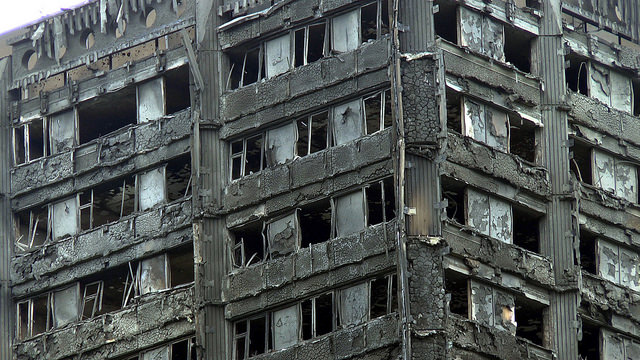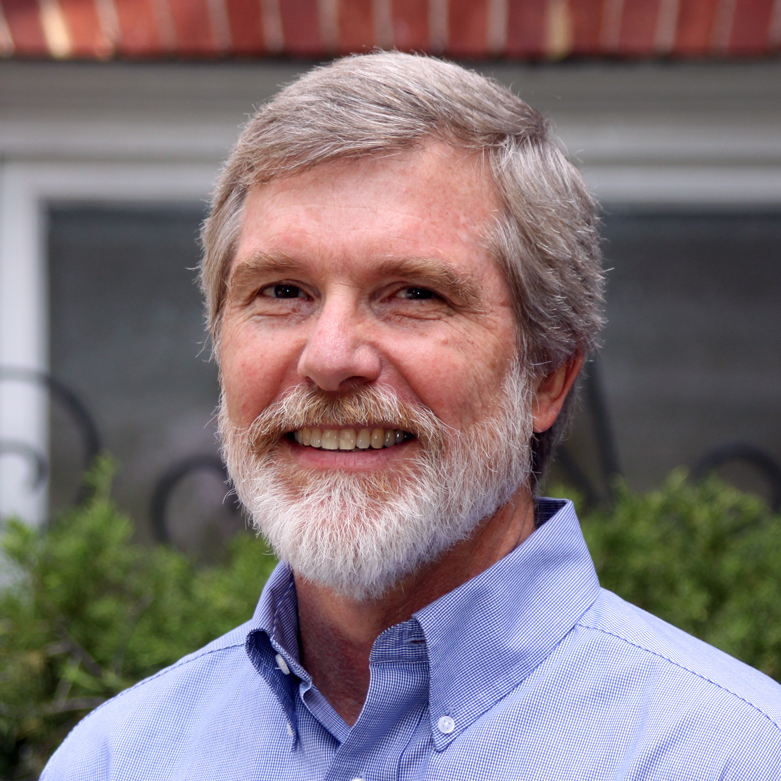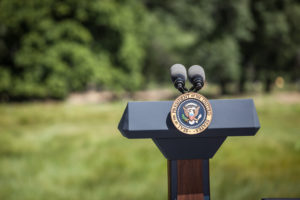
Executive Order 13,771 could lead to incidents like the Grenfell Tower fire in the United States.
The recent series in The Regulatory Review debating the constitutionality of President Donald Trump’s “one-in-two-out” executive order raises important issues, but it misses the broader dangers presented by deregulation and the further ossification of the rulemaking process created by the order.
The constitutionality of the executive order needs to be resolved in light of “the dangers of reflexive rejection of regulation,” a policy approach promoted by the Trump Administration and by conservatives since President Ronald Reagan. Sadly, the disastrous Grenfell Tower fire in London, and the history of fire safety efforts more generally, illustrates the failure—and harm to the public—of formulaic prescriptions such as the one-in-two-out rulemaking approach.
In the United States, the debate should be about the dangers of deregulation, with its toolkit of cutbacks, out-sourcing of government functions to third parties, and a cost-saving ethic that the London fire exemplifies.
Citizens of the United Kingdom are already engaged in a vociferous debate after almost 40 years of Thatcherism that was embraced by both Conservative and Labour governments. A recent New York Times article asking whether deregulation has gone too far quotes even Conservative politicians as saying that the United Kingdom has “moved too far away from state as guarantor.” Economist Simon Tilford of the Centre for European Reform said:
We’re seeing the biggest challenge to this 40-year drive to marginalize or discredit the state and its role in the economy and society. Grenfell Tower had such impact because it symbolizes for many in Britain the retreat of the state, visible in badly maintained social housing and the failure to build more social housing.
Between 2011 and 2015, Britain moved from a regulatory regime of one-in-one-out to one-in-three-out, leaving inadequate safety standards across important areas of vital consumer protection. In the United States, Executive Order 13,771 endangers a similar, broad range of protections built up over years, as required by Congress.
Proponents of the mechanistic approach reflected in a one-in-two-out policy often claim that regulation hurts the economy and costs jobs, or they say that states should shoulder the responsibility for public protections, not the federal government. They often claim governments cannot effectively provide appropriate regulation, so we should rely on the private sector to decide what level of regulation adequately protects the public. Yet the proponents of these positions provide scant evidence for their positions.
On the contrary, years of studies of the impact of regulation point in the opposite direction. Regulation often leads to business innovation and public benefits that overwhelm the costs. In a 2011 Economic Policy Institute review of these studies, Isaac Shapiro and John Irons concluded:
The lessons of the Great Recession and of decades of government regulation point in the opposite direction. An emphasis on deregulation can contribute to enormous economic dislocation, and this review of the studies of regulations in place finds little evidence of significant negative effects on employment. Overall, the picture that emerges from this review is a positive one. For decades, regulations have generally and consistently struck a reasonable balance, with their benefits to health, safety, and well-being far exceeding their costs.
Moreover, we know from recent and past nationwide public opinion polling that there is strong support for health, safety, and environmental regulations, including majority support for the agencies that write the rules.
There is also strong support for the enforcement of regulations. Whether enforcement is defined as “commonsense,” “fairer, more equal,” “proper,” or “tougher,” 74 to 94 percent of voters agree that we need increased enforcement. This support is bipartisan and exists across geographical, demographic, and socio-economic divisions. Seventy-nine percent of democrats, 63 percent of republicans, and 73 percent of independents believe increased enforcement is a good thing.
Voters across party lines also strongly believe there is a role for government to protect Americans from harm resulting from unfair and unsafe business practices. Voters also support punishing those who cause harm to our physical or economic well-being and the need for tougher penalties. In addition, majorities of voters believe that there is a critical role for enforcement especially when it comes to clean water and protecting us from food and drugs from other countries.
Opinion polls also show that voters largely reject the deregulatory arguments that regulations and enforcement kill jobs, increase costs, and hurt small businesses. Instead, voters believe insufficient regulation and enforcement has already had disastrous consequences for Americans. Although the United States may avoid a Grenfell Tower accident, we have already seen incidents in the United States, like the overflowing of 100,000 gallons of coal slurry from a containment facility and the blackening of about six miles of a West Virginia creek. We have also seen lead contamination in Flint, Michigan’s drinking water.
As part of its deregulatory agenda, the Trump Administration has delayed many rules that impact workers. For example, rules were delayed that protect workers from two chemicals that can cause lung cancer—crystalline silica and beryllium—leaving millions of workers exposed in their workplaces. The question now is whether and how these rules will go into effect under the Trump Administration.
Executive Order 13,771 provides a clear indication of the intent of this President. The one-in-two-out requirement is likely to slow down rulemaking considerably and certainly impact the ability of federal agencies to fulfill their missions. As in Britain, this trade-off approach to regulation is likely to lead to some health, safety, and environmental rules being eliminated in order to meet the regulatory budgets the new executive order imposes. Debating the constitutionality of the executive order is important, and the courts could bring an end to this formulaic approach. Regardless of the order’s legality, however, it is bad policy.
Although the United States may avoid a catastrophe like the Grenfell Tower fire, there is no reason to believe that a different health and safety record may result in the United States after just as many years of deregulatory fervor.
The photograph of Grenfell Tower is used unaltered under a Creative Commons license belonging to Chiral Jon.





